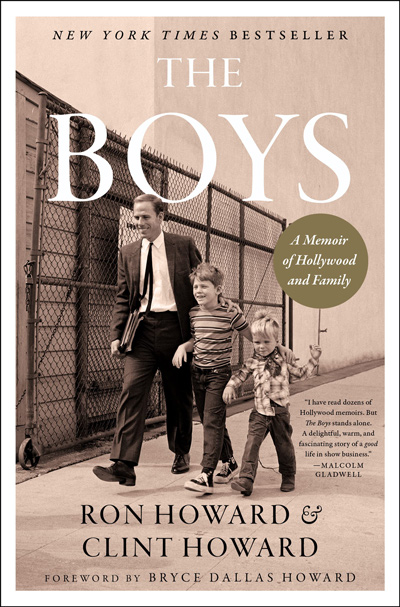Welcome!

Pixabay
‘Andy Griffith’ actors have a lot to reveal in ‘The Boys’
By Neill Caldwell
Review of “The Boys: A Memoir of Hollywood and Family” by Ron Howard and Clint Howard

“The Boys,” the new book by brothers Ron and Clint Howard, is especially appealing for those of us who grew up watching a lot of TV in the ’60s and ’70s. But the real stars of the book are not the young actors, but their parents, Rance and Jean Howard, who managed to keep the duo grounded with Midwestern values in the middle of Hollywood.
The book jacket sums the contents up well, with an image of dad walking young Ronny and Clint the short two blocks from home to the Desilu Studio where “The Andy Griffith Show” was shot, with smiles all around.
Rance Howard, who constantly searched for and found work on stage and on screen while managing the careers of his more successful offspring, was known on sets as the opposite of a “stage mother”; he was a parent who was easy to work with while making sure Ron and Clint were always dependable and professional, knew their lines and how to hit their marks. Plus if there was a small role for a tall thin guy, he was ready.
He also may deserve some credit for shaping “The Andy Griffith Show” into the show we know and love. Opie was originally envisioned as a wise-cracking kid, much like Danny Thomas’s son Rusty in the show that “TAGS” was spun off of. But during a cigarette break at the very first table read, Rance suggested to Andy that maybe Opie would actually like and respect his father, rather than make jokes at his expense. Thus a No. 1 show was born of which the Opie-Andy relationship was a key.
There are plenty of insider stories like that in the book.
Throughout his life Rance Howard proved you could never take the Oklahoma out of the boy, as he was always ready to calmly and practically explain things like the meaning of certain words on the bathroom stalls at Desilu to the reason the Griffith crew treated Jim Nabors one way to his face and another behind his back.
Jean was maybe the more naturally talented of the Howard parents, who met doing “Snow White” in an acting troupe, but like many women of her era decided to give up her career in order to raise a family. (That is, until Ron cast her as a nursing home resident in his fantasy film “Cocoon,” which started something of a resurgence for Mom.)
The book details the careers of the brothers from the moment cute red-headed Ronny fell into movie and TV roles before he could even read the scripts. He actually landed two TV pilots at the same time: one with Burt Lahr (who played the Cowardly Lion in ‘The Wizard of Oz”) that didn’t get picked up and one with a country comedian from Mount Airy that did. Early on in the Griffith run he was cast in “The Music Man” despite having no real music ability, adding a blockbuster movie experience on his growing resume.
Clint followed his big brother onto the Griffith set and landed a recurring role as Leon, who while dressed in his cowboy getup thrusts PB&Js into the faces of co-stars like Don Knotts. That led to a memorable one-off role as an interstellar god in the first season of “Star Trek” and a starring slot beside a bear on “Gentle Ben.”
Early on Clint realized he would never be a lead actor but instead was headed to character roles from a wacked-out serial killer (the Smog Strangler) on “Seinfeld” to a NASA engineer on Ron’s “Apollo 13.”
Of course, having a brother who’s an A-list movie director can help one find work (it also helped Rance and Jean several times), but Clint didn’t limit himself to Ron projects. (There’s one funny story about Clint trying out for the lead in a little film called “Star Wars” and having such a horrible audition that literally the guy behind him in line – Mark Hamill – must have come off as the greatest actor of all time and got the part of Luke Skywalker.)
Clint comes off as the more interesting of the brothers, probably due to his willingness not to pass up any recreational drug coming down the pike. Ron, by comparison, marries his high school sweetheart after blowing a big movie paycheck on a (gasp) VW Beetle. Of course, Ron was never that far away from Opie Taylor/Richie Cunningham. He was always a work-a-holic, at one point shooting a hit TV show (“Happy Days”), a movie that happened to be John Wayne’s last (“The Shootist”), making his directing debut (“Eat My Dust”) and coaching Clint’s basketball team — all at the same time!
But there’s also some fun Ron Howard stories, including being the target of Harrison Ford’s rain of empty beer bottles at a run-down Holiday Inn while filming “American Graffiti.”
What he really wanted to do was direct, something he’s developed an interest in while shooting “Andy Griffith” and constantly badgering the crew about lighting and camera set-ups. How that came about is an interesting story: Approached by the “King of the B-Movie” Roger Corman to appear in one of his corny but popular movies, Ron turned the tables on the famous director. “I’ll do TWO movies for you,” Howard said, “if you let me direct the second one, too.”
A second round of sitcom stardom, this time on “Happy Days,” fell into his lap as well, after he was asked by Garry Marshall to shoot a pilot for ABC. The pilot was shuttled off to an episode of “Love American Style” and disappeared. That is, until “American Graffiti” became the surprise hit of the summer and nostalgia suddenly became hot again. Marshall reminded ABC that it already had a nostalgia show ready to roll, and it just happened to star the star of “American Graffiti” himself! But it didn’t take long for Howard to get unseated as the show’s star by Henry Winkler’s Fonzie character, who had all of six lines in the opening episode. And just as Andy Griffith had shifted from his own show’s comic focus to be the straight man, setting up Knotts and the other crazies who populated Mayberry, Ron also shifted for “The Fonz” to take over the spotlight. He and Winkler even had a heart-to-heart about the unexpected change, a chat which much have gone really well because Winkler became godparent to all four of Howard’s children.
The brothers Howard have said that they decided to combine on this memoir as a way to process their grief when their father died a couple of years ago, and it’s clearly an homage to father Rance. The structure is a little different, but works for two brothers who shared so much only to diverge into such different lives. The book ends with both boys now solidly as adults, but that’s OK, as the story is really about growing up as a well-connected family.
Neill Caldwell grew up in Aberdeen, NC, and has spent most of his life in North Carolina, including time in Asheboro working for The Courier-Tribune as a copy editor. Currently, he is editor of The Stokes News in King, NC.
